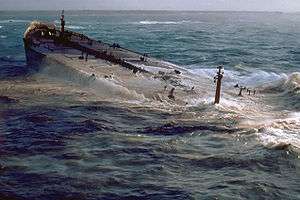Amoco Cadiz
 The sinking Amoco Cadiz | |
| History | |
|---|---|
| Name: | Amoco Cadiz |
| Owner: | Amoco Transport Co. |
| Port of registry: |
|
| Builder: | |
| Yard number: | 95 |
| Laid down: | 24 November 1973 |
| Launched: | 1974 |
| Completed: | May 1975 |
| Out of service: | 16 March 1978 |
| Identification: | IMO number: 7336422 |
| Fate: | Sunk at 48°36′N 4°42′W / 48.6°N 4.7°WCoordinates: 48°36′N 4°42′W / 48.6°N 4.7°W |
| Notes: | [1] |
| General characteristics | |
| Tonnage: | 233,690 DWT; 109,700 GRT |
| Length: | 334.02 m (1,095.9 ft) |
| Beam: | 51.06 m (167.5 ft) |
| Draught: | 19.80 m (65.0 ft) |
| Installed power: |
|
| Propulsion: | Single screw |
| Speed: | 15 knots (28 km/h; 17 mph) |
| Capacity: | 1.6 Mbbl (250×103 m3) |
| Crew: | 44 |
| Notes: | [1][2] |
Amoco Cadiz was a very large crude carrier (VLCC) under the Liberian flag of convenience owned by Amoco and transporting crude oil for Shell. On 16 March 1978, she ran aground on Portsall Rocks, 5 km (3 mi) from the coast of Brittany, France; and ultimately split in three and sank, resulting in the largest oil spill of its kind in history to that date.[1][2]
Oil spill
On 16 March 1978 in a southwesterly gale, the Amoco Cadiz passed Ushant at the western tip of Brittany, headed for Lyme Bay in the United Kingdom. At 9:46 am when the supertanker was north of Ushant and 16 nautical miles (30 km; 18 mi) west of Portsall she turned to avoid another ship and her rudder jammed, full over to port. The captain shut down the engine and attempted to make repairs, but they were not successful. Meanwhile, the wind began blowing from the northwest, driving the ship toward the coast. By the time the tugboat Pacific successfully attached a hawser, it was 2:00 pm and the Amoco Cadiz had drifted 6 nautical miles (11 km; 6.9 mi) closer to the shore. For two hours, the tugboat struggled to slow the vessel's drift, but then the towline parted. The captain of the Amoco Cadiz turned his engines on full astern and this helped slow the ship's drift. At 7:00 pm, the captain shut down the engines so that the Pacific could try to attach another hawser. The supertanker dropped one anchor, but the flukes broke off. At this point the supertanker was drifting at 2 knots (3.7 km/h; 2.3 mph) toward the Portsall Rocks. A new towline was successfully attached at 8:55 pm but the Amoco Cadiz hit a rock soon afterward and began to leak. At 9:30 pm near the Corn-Carhai lighthouse, a rock ripped a hole in the ship and flooded the engine room.[3]
Amoco Cadiz contained 1,604,500 barrels (219,797 tons) of light crude oil from Ras Tanura, Saudi Arabia and Kharg Island, Iran.[4] Severe weather resulted in the complete breakup of the ship before any oil could be pumped out of the wreck, resulting in her entire cargo of crude oil (belonging to Shell) and 4,000 tons of fuel oil being spilled into the sea.[5]The US NOAA estimates that the total oil spill amounted to 220,880 metric tonnes of oil.[6]
The event was a seminal moment in maritime history as with the advent of modern communications and in view of the significant sums involved the captain was reluctant to singularly accept responsibility for accepting a Lloyd's Open Form arrangement proposed by the rescue tug. This led to delays resulting from efforts to contact the company's higher management structure in the US. Historically a captain as termed 'Master Under God' was the final word in all situations involving the ship, the crew, passengers and cargo.
See also
- SS Torrey Canyon – nearby and similar oil spill disaster in 1967
- MT Haven – formerly Amoco Milford Haven, sister ship of Amoco Cadiz, that sank causing an oil spill disaster in 1991
- List of environment topics
- List of oil spills
References
- 1 2 3 "Amoco Cadiz (IMO 7336422): Summary for Casualty ID 19780316_001". Casualty Database. Center for Tankship Excellence. Retrieved 16 June 2010.
- 1 2 Visser, Auke (26 August 2010). "Amoco Cadiz". International Super Tankers. Retrieved 9 September 2010.
- ↑ Calder, Nigel (1986). The English Channel. Harrisonburg, Va.: Viking. pp. 32–33. ISBN 0-670-80022-8.
- ↑ Boileau, David; Allen, Tony; Claes, Johnny (4 July 2009). "Amoco Cadiz (+1978)". The Wrecksite. Retrieved 11 June 2010.
- ↑ Hartog, C. den; Jacobs, R.P.W.M. (March 1980). "Effects of the Amoco Cadiz Oil Spill on an Eelgrass Community at Roscoff (France) with special reference to the mobile benthic fauna". Helgoland Marine Research. Berlin / Heidelberg: Springer. 33 (1–4): 182–191. doi:10.1007/BF02414745. Retrieved 11 June 2010.
- ↑ "Oil spill - Amoco Cadiz". incidentnews.noaa.gov. NOAA. Retrieved 7 May 2018.
External links
